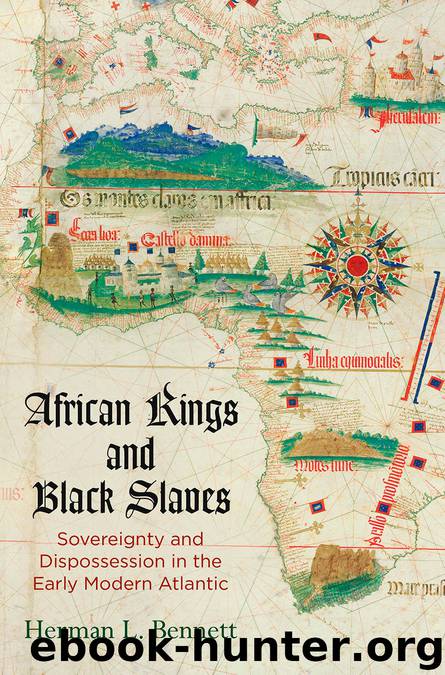African Kings and Black Slaves by Bennett Herman L.;

Author:Bennett, Herman L.; [Bennett, Herman L.;]
Language: eng
Format: epub
ISBN: 9780812250633
Publisher: University of Pennsylvania Press
Published: 2018-01-15T07:00:00+00:00
With Dom Henrique’s death in 1460, the monopoly reverted to the Portuguese Crown. During the next twenty-one years (culminating with Dom Afonso’s death), the Portuguese steadfastly explored and traded in Guinea, though they did so without their earlier zeal. Preoccupied with possessing the Castilian throne and his North African conquests, Dom Afonso (1449–81) distributed the monopoly between his son, João, and several court favorites.76 Two years after Henrique’s death and twenty years after the Portuguese ventured beyond Cabo Blanco, they had christened the region south of the Senegal River to present-day Sierra Leone the “Guinea of Cape Verde.” The Portuguese quickly established their administrative center, Santiago, in the Cape Verde archipelago, from which they explored but only occasionally settled the mainland of the Upper Guinea Coast—a riverine region named the “rivers of Guinea” that soon constituted Portugal’s principal source for trade, including human chattel.77 Despite Dom Afonso’s lack of interest in Guinea, he and his representatives asserted royal authority over the concessions his predecessors had granted Dom Henrique, most notably in matters related to justice.78 In subsequent grants and privileges, the Crown restricted the beneficiaries’ juridical authority, which had been part of the “colonial concessions” extended to explorers, discovers, and conquerors. According to one astute student of colonization, sovereigns during the early modern period consciously sought “to reduce that autonomy to proportions fitting the prestige and authority of the centralized and increasingly absolute monarchy.”79 Yet even during Dom Afonso’s reign, some notable exceptions prevailed. On June 12, 1466, Afonso granted Cape Verde’s Christian inhabitants a royal charter over the Guinea trade except Arguin Island. Declaring that “people are unwilling to go live there, unless they are given very wide privileges and franchises,” Afonso bestowed “civil and criminal authority over all the Moors, black and white, free and captive, and over all their descendants, who are in the said island, although they be Christians.”80 While granting his vassals juridical authority “over all the Moors, black and white, free and captive,” Afonso carefully worded this privilege to apply only to those “who are in the said island.” By his actions, Afonso did not arbitrarily extend his dominion over Moors. Moors and black Africans either willfully attached themselves to Cape Verde’s nascent Christian república or represented enslaved persons who on the basis of their sovereignless subjectivity entered Christian dominion. This grant did not imply that the king’s authority or that of his vassals extended to the mainland or its inhabitants. This decree and the grant bestowed on Fernão Gomes (who in exchange for a monetary settlement along with the annual exploration of an additional hundred leagues of the Atlantic littoral received exclusive rights over the Guinea trade) magnifies Portugal’s regulatory practices aimed at safeguarding their monopoly from Christian interlopers. Such practices assumed greater importance in the last decades of the fifteenth century but especially during the War of Spanish Succession (1475–79) in which Afonso played a prominent role.
In the context of Hispania’s escalating rivalry complicated by the Castilian succession dispute, Dom Afonso’s Castilian opponents carried their conflict into Guinea, thereby defying Romanus Pontifex.
Download
This site does not store any files on its server. We only index and link to content provided by other sites. Please contact the content providers to delete copyright contents if any and email us, we'll remove relevant links or contents immediately.
| General | Discrimination & Racism |
Nudge - Improving Decisions about Health, Wealth, and Happiness by Thaler Sunstein(7709)
The Fire Next Time by James Baldwin(5447)
iGen by Jean M. Twenge(5417)
Adulting by Kelly Williams Brown(4574)
The Sports Rules Book by Human Kinetics(4388)
The Hacking of the American Mind by Robert H. Lustig(4383)
The Ethical Slut by Janet W. Hardy(4256)
Captivate by Vanessa Van Edwards(3840)
Mummy Knew by Lisa James(3693)
In a Sunburned Country by Bill Bryson(3543)
The Worm at the Core by Sheldon Solomon(3487)
Ants Among Elephants by Sujatha Gidla(3467)
The 48 laws of power by Robert Greene & Joost Elffers(3293)
Suicide: A Study in Sociology by Emile Durkheim(3024)
The Slow Fix: Solve Problems, Work Smarter, and Live Better In a World Addicted to Speed by Carl Honore(3010)
The Tipping Point by Malcolm Gladwell(2926)
Humans of New York by Brandon Stanton(2873)
Get What's Yours for Medicare: Maximize Your Coverage, Minimize Your Costs by Philip Moeller(2740)
Handbook of Forensic Sociology and Psychology by Stephen J. Morewitz & Mark L. Goldstein(2705)
